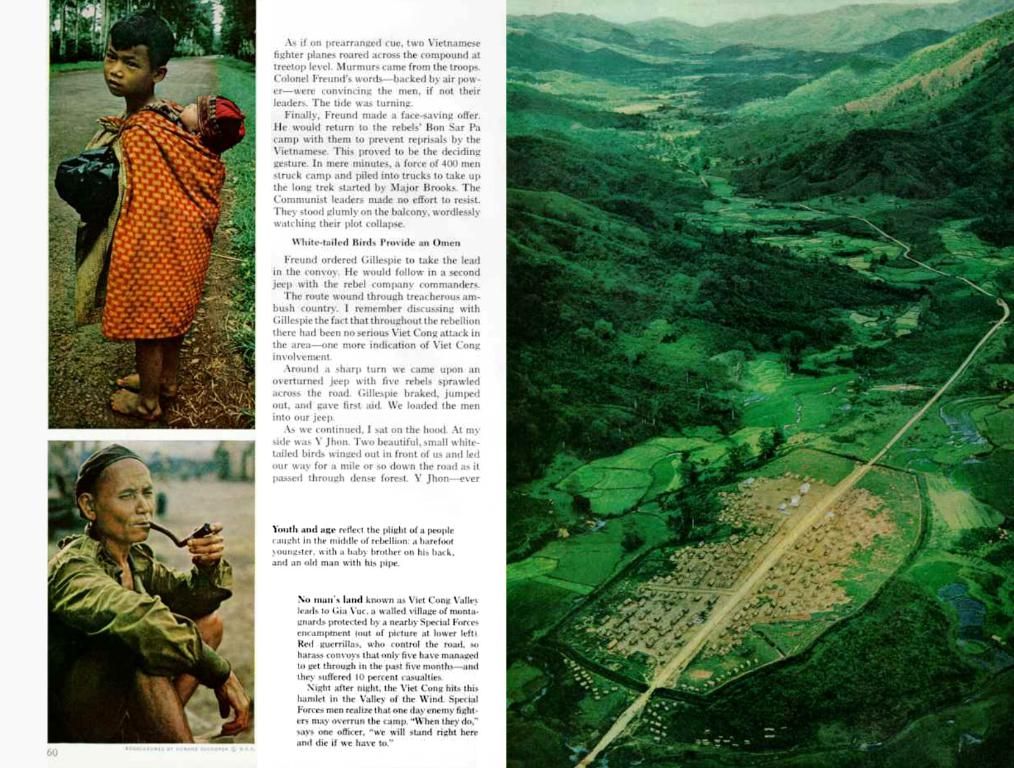Unanticipated City Development and Feminist Urban Planning: Sharee Hochman's Perspective
Meet Sharee Hochman, a name that'll be synonymous with urban revolution in no time. Her bubbling enthusiasm is as contagious as it is inspiring. And let's face it, her story's headline-worthy - she never planned to be a city guru!
From Communication to City-Building
A degree in Rhetoric Communication & Sociology, a humanitarian streak, and a job as Communications Coordinator for Volunteer Manitoba all steered Sharee towards a career focused on community. But urbanism was far from her initial game plan.
Growing up in the sprawling suburbs of Winnipeg, the city was always at a distance, an isolating 30-minute-drive away. However, a stint in Berlin in 2019 flipped the script! This vibrant city offered a stark contrast to Sharee's suburban upbringing, with its mixed-use buildings, walkable neighborhoods, and reliable public transportation. It sparked a revelation: the physical environment could impact us positively or negatively. And so, the CityChanger seed was sown.
Before long, Sharee was volunteering her communication skills to promote sustainability, first at the Urban Economy Forum, then with Bike Winnipeg and the Winnipeg Trails Association. Once bitten, she was hooked! "I started living and breathing it. I'm writing about it, researching it, and getting involved with my community," she shares, her excitement palpable.
A Woman on a Mission
Together with sustainable transportation expert Nicole Roach, Sharee co-founded Women in Urbanism Canada (WIUC) in 2021. Their aim? To empower and mobilize women-led transformation in Canadian cities. They met online through the power of social media - Twitter, to be exact, a digital hub for urban and bike communities!
WIUC seeks to create a space for self-identifying women in urbanism to come together, share resources, challenges, and learn from each other. Valuing equitable, sustainable, enjoyable, and accessible cities, WIUC holds that cities ought to enhance health, happiness, beauty, quality of life, and safety for everyone. They're currently focusing on women's mobility and have been collaborating with Apathy is Boring, a change-making organization, to present panels on feminist cities as resilient cities.
Winnipeg's Tale of Tale
WIUC is an answer to the Canadian epidemic of poor city planning. Over the last 30 years, Winnipeg's suburbs have doubled in size, yet the city's population has only grown by about 30%. Multi-modal and soft transport networks are largely absent, leading to diminished mental and physical benefits for residents. But there's more to it than that – it's about access, quality of life, and dignity.
Historically, the planning realm has been dominated by men, reinforcing gender inequalities in urban environments. Research indicates that two-thirds of unpaid labor in Canada is still undertaken by women, perpetuating these age-old problems.
What Women Want (And Deserve)
Women in Canadian cities, Sharee argues, have faced car-centric urban designs that cater to the typical male breadwinner, commuting directly to and from work. In contrast, women's mobility patterns often involve trip chaining, juggling work, family, and social obligations that traditional urban designs don't cater to. Flexible, accessible, safe, affordable, well-connected transportation infrastructure, as well as a shift in mindset towards inclusivity and a normalization of diverse mobility patterns, are keys to a feminist city.
A City for All
A feminist city prioritizes the most vulnerable, extending far beyond women. Traditional feminist theories, Sharee points out, tend to focus on white, able-bodied women. The city of the future must account for intersectionality to truly cater to all.
Addressing accessibility, safety, and inclusivity for people of various backgrounds, abilities, and identities is a major priority for Sharee and WIUC. This means green spaces that cater to everyone, increased lighting, free transit fare, extended sidewalks, safer bike lanes, better connectivity between modes of transport, and an increase in public washrooms – amenities that benefit us all.
Advice from an Advocate
Sharee was among the top 300 applicants to the 4CITIES program, a prestigious urban planning competition. Impressive, given her lack of formal urban planning education! As a Young Leader at the Urban Future 22 conference in Helsingborg, Sharee dispenses sage advice for those eager to dive into urbanism:
- Volunteer: Volunteering builds comfort levels and connections, fostering new skills along the way.
- Leverage Your Skills: Urbanism is an interdisciplinary field, and your existing skills can help fill unique roles in tackling urban challenges.
- Just Get Started: Sharee believes that a first draft is invaluable, so don't let perfection stand in the way of progress!
Like Sharee, we can all embrace opportunities to create positive change in the cityscape. Let's make a difference today, together!
A Canadian Woman in Urbanism in a Nutshell
Sharee Hochman is a shining example that age is just a number when it comes to revolutionizing cities. Passion is a powerful tool, and Sharee's boundless enthusiasm is a testament to that. Gender inequality in urban planning is pervasive, but Sharee's work with Women in Urbanism Canada is empowering women, fostering diverse perspectives, and pushing for change that benefits all urban residents. To follow Sharee's journey or learn more about Women in Urbanism Canada, check out her Journo Portfolio or the Women in Urbanism Canada website regularly!
- Sharee Hochman's passion for urbanism extends beyond her degree in Rhetoric Communication & Sociology, encompassing fashion-and-beauty, food-and-drink, home-and-garden, relationships, pets, travel, cars, and education-and-self-development.
- Her personal-growth journey is rooted in the love for sustainable transportation and city-building, initiated by her experience in Berlin in 2019.
- In her career-development path, Sharee volunteered her communication skills for various organizations, including Urban Economy Forum, Bike Winnipeg, and the Winnipeg Trails Association.
- Alongside sustainable transportation expert Nicole Roach, Sharee co-founded Women in Urbanism Canada (WIUC) in 2021, advocating for women-led transformation in Canadian cities.
- WIUC prioritizes equitable, sustainable, enjoyable, and accessible cities, focusing on women's mobility, as traditional urban designs often fail to cater to diverse mobility patterns.
- Sharee and WIUC aim to address accessibility, safety, and inclusivity for people of various backgrounds, abilities, and identities, pushing for a more inclusive urban landscape that prioritizes the most vulnerable.
- For those interested in urbanism, Sharee advises volunteering, leveraging existing skills, and just getting started – a sentiment that can apply to shopping, sports, and football enthusiasts aiming to contribute to European leagues and local communities.
- Sharee Hochman's influence on the Premier League of urban revolution is imminent, inspiring a new generation of city changers.







